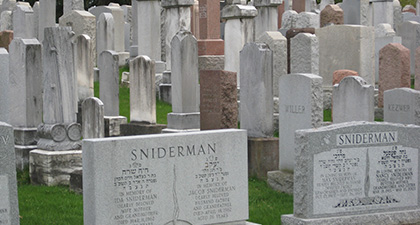When Adam Dean’s parents died within a year of each other, there was no question that they would be buried together, and in a Jewish cemetery.
“They were the most in love people you could imagine. They had to be buried together,” said Dean.
“Their faith in Judaism was a very big sustaining part of their life.” It shaped the friends they made, their activities, their values and the way they raised their children, he said.
“Being buried in a Jewish cemetery was absolutely everything to them. There would have been no other suitable choice – period.”
Related Stories:
Jewish funeral costs vary by location
Cremation still a sensitive topic in community
The couple had belonged to Toronto’s Temple Sinai since 1980 and raised their children as Jews, but Adam’s father had never converted to Judaism.
Until recently, the couple’s desire to be buried together in a Jewish cemetery in Toronto would have been impossible to fulfil. The city’s largest communal Jewish cemeteries, Pardes Shalom and Pardes Chaim operated by Toronto Hebrew Memorial Parks (THMP), do not permit the burial of non-Jews, including spouses, said executive director Howard Mammon.
That restriction is in THMP’s bylaws. “Our rules allow us to only bury Jews. Unless there is a change to our bylaws, that will continue to be our policy.”
Mammon said many of THMP’s constituent groups – synagogues, temples and burial societies – are small “c” conservative, especially compared to their American counterparts, and many are not eager to see a change. “A large part of our membership wants the status quo,” he added.
UJA Federation of Greater Toronto, which appoints seven of the members on THMP’s 14-member board, studied the issue last year, meeting with rabbis from across denominations and with funeral homes, said Jeff Springer, senior vice-president for corporate affairs.
The question of interfaith burials raises a number of issues. Even if all the proper halachic preparations are made – for instance, providing gates and separate entrances – there is the question of the expectations of families who have already buried loved ones in the cemeteries, Springer said.
In the end, with no unanimity to be found, the federation decided to maintain the status quo and re-examine the issue in a few years. While the numbers of people who are currently looking for interfaith burial plots are not high at the moment, it’s certainly an issue that will become more pressing 20 years from now.
“It’s on the communal radar,” Springer said.
Both the Conservative and Reform movements have ruled that non-Jewish partners may be buried in a Jewish cemetery. The Conservative movement’s decision in 2010 specified that the interfaith section be separated from the rest of the cemetery by a small road. Both movements specify that only Jewish ceremonies are to be performed and that monuments cannot have symbols of other faiths.
Six years ago, Temple Sinai purchased a section of the Lambton Mills Jewish cemetery specifically for interfaith families who were affiliated with the Jewish community.
“If you’ve invested in our community, then our synagogue says we’re going to invest in you. We’re going to provide you the same level of choice any other family would have,” says Rabbi Michael Dolgin.
It took several years for the cemetery to be licensed, and Adam Dean’s mother was among the first to be buried in the new section in 2013.
“Creating the section allows for a much more compelling and sustainable form of Judaism,” Dean said. “ It allows for the commitment people make when they’re married, to continue on after death.”
Winnipeg’s Congregation Shaarey Zedek, the largest Conservative synagogue in Western Canada, made a similar decision a few years ago and dedicated a small section of its cemetery to interfaith burials. The section has its own entrance and is surrounded by a fence, but “you don’t feel it’s violating any esthetic standards,” said Rabbi Allan Green.
“These days there isn’t a family without an intermarriage,” said Rabbi Green. “We want to facilitate as much Jewish ritual as we can.”
About 50 out of the 900 families who are members of Shaarey Zedek are intermarried, but the intermarriage rate for young Jews in the community is as high as 70 per cent, Rabbi Green said. “I have the feeling we’re on the leading edge of this.”
This approach to interfaith burials is not shared by all Conservative rabbis.
Rabbi Jarrod Grover, of Toronto’s Beth Tikvah Synagogue, argues that reserving burial in a Jewish cemetery for Jewish couples is one of the few restrictions Conservative Judaism can still impose. And in some cases, it may be enough to nudge a non-Jewish spouse who has long affiliated with the community to consider conversion.
“This remains the only standard the community has in an age of intermarriage,” Rabbi Grover said. “I have seen cases where couples re-evaluated conversion because of this.”
In Toronto, intermarried couples can be buried together in a non-denominational cemetery, he said.
Rabbi Grover said he is one of the few Conservative rabbis in the city who will officiate for a Jewish spouse in these circumstances.
“We honour the dead. I don’t leave people to keep calling until you find someone to officiate.”
